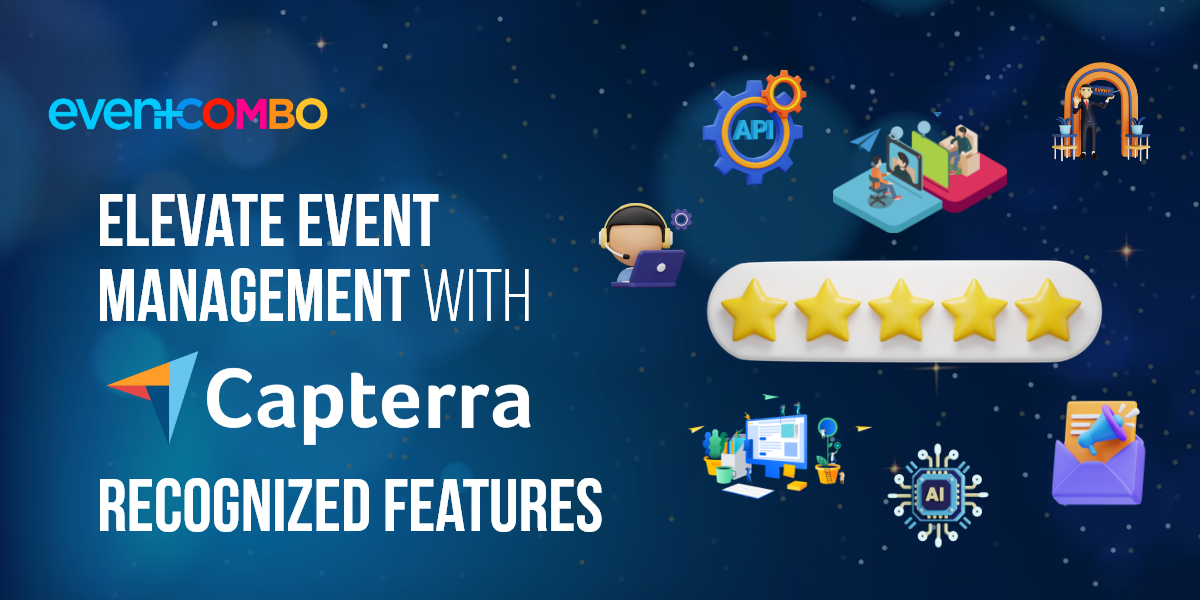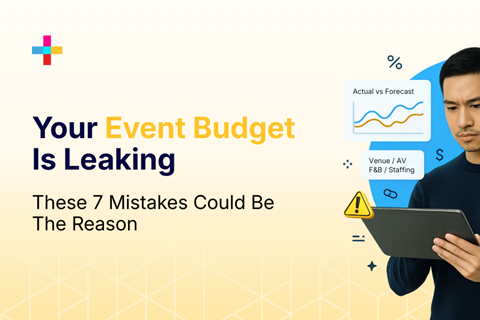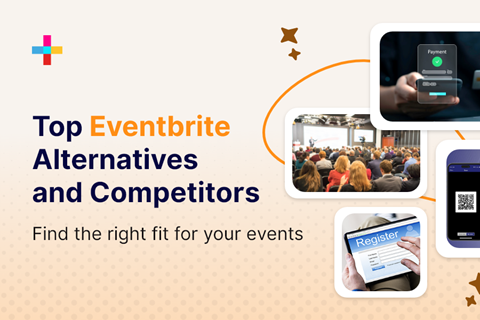

Let us begin by discussing a real-world scenario. So, you've found an event management software with robust ticketing feature, and you're thrilled because you've finally discovered the ultimate solution. It exceeded your expectations. But when it came to managing speaker lineup and session scheduling, it dropped the ball. Suddenly, your carefully curated sessions turned into a chaotic mess, leaving you running around the venue to salvage the situation.
And now, you find yourself on the hunt for a new event management software that can also manage speakers and sessions with finesse, along with ticketing. And let's not forget post-event data management because that’s non-negotiable. Event planners often struggle to segregate data effectively, or worse, are left questioning if the data collected is indeed useful or simply a tangled mess of numbers.
These are just a few reasons why event tech can either be your best friend or your worst nightmare. Event planning is a complex process, encompassing a myriad aspects, and if you want event management software to be your true ally, it must encompass a range of essential features. And that’s a necessity, particularly in times when the event industry is proliferating, and attendee expectations are rising.
What Is an Event Managment Software?
Event management software includes tools designed to handle various aspects of planning and managing events, including registration and ticketing, venue booking, marketing, and more. Additionally, there are tools for creating event websites, engaging attendees, and calculating event ROI. Each tool targets a specific aspect of event planning, automates manual tasks, and delivers real-time insights for ongoing improvements. While there are different solutions available in the market, having a consolidated, all-in-one solution with all essential event management features can be a game-changer.
Identifying Stakeholders for Choosing Event Management Software
Selecting the right event management software requires careful consideration of all stakeholders involved, including attendees, organizers, marketers, and sponsors.
24 Features Your Event Management Software Must Have
Eventcombo recently earned badges and accolades from Capterra, thanks to outstanding customer ratings, which highlighted our innovative features. Proud, thankful, and motivated, we've curated a guide for event planners to help them identify essential features and make an informed choice when selecting the best event management software.
1. Registration Management
Attendees are often deterred by the complexity and rigidity of registration processes, which underscores the need for a streamlined platform tailored to the specific needs of the event. Customizable registration forms with conditional logic capabilities and branding options address this challenge. They also empower organizers to collect precise attendee information needed to further personalize the event experience. Smooth and custom registration not only delights attendees but also helps organizers achieve their brand awareness goals.
2. Single Dashboard
Event planners have long been frustrated with the tedious task of juggling multiple logins and platforms for managing various aspects of event planning. This scattered approach not only diminishes efficiency but also increases the likelihood of errors or oversights. A single dashboard serves as the control center for your entire event, offering a centralized view of all aspects, from ticket sales to session schedules and attendee engagement. With software that brings everything in one place, you can streamline operations and ensure nothing falls through the cracks
3. Automated Workflows
Automated workflows are indispensable for streamlining processes and cutting down on manual tasks, thereby minimizing errors. They encompass a wide array of functions, from sendingemails or reminders to attendees, to generating reports and coordinating venue bookings. By strategically automating tasks, you liberate time to concentrate on higher level activities, guaranteeing that your event operates seamlessly and efficiently.
4. Multiple Admin Management
Multiple admin management is crucial, especially amid the rising threat of data breaches. Instead of sharing your entire dashboard and all the data with all team members, this approach lets you assign different access levels based on their roles.This ensures that everyone can focus solely on their designated tasks, which enhances both accountability and efficiency. Moreover, this structured segregation of access rights minimizes the risk of errors or security vulnerabilities, safeguarding sensitive information effectively.
5. Website Builder
Let's talk about the website builder feature which can be a real asset. With this tool, you can craft a professional event website even if you're not a tech whiz. And if you happen to have some coding chops, you can dive in with custom CSS to truly make it your own. A customized site not only reflects your branding but also delivers all the essential info attendees need in an appealing way. A robust event website builder with a simple user interface makes it easy for anyone to create stunning websites that drive registrations and make a striking first impression.
6. Speaker Management
Effective speaker management helps you organize and communicate with your speakers while also managing their profiles, schedules, contracts, and promotional materials in one place. A streamlined speaker management process ensures that your speakers have a positive experience, which in turn enhances the overall impact of your event.
7. Sponsor Management
Sponsors look for ROI and prime real estate to associate with an event. Sponsor management feature in your event management software can turn their involvement into a highly satisfying experience. This includes easy document sharing and strategically designed whitespace in the platform or mobile app for sponsor p Such features are important to make your sponsors feel valued, maximize their exposure, and create a long-term alliance for future events.
8. Advanced Analytics
Comprehensive analytics is essential for measuring your event's success—they go beyond just generating reports. AI-driven analytics lets you dive deep into insights on attendee engagement, financial performance, and operational efficiency. This isn't just for a single event; you can even compare insights for multiple events. With real-time data and detailed reports, you can make informed decisions, show ROI to stakeholders, and improve planning, even on the go.
9. Custom Reports
In today’s data-driven world, cookie-cutterreports aren’t really helpful when event goals vary. Custom reporting capability in your event management software, which allows you to choose or create filters and tailor reports, is paramount. This way, you can focus on the specific metrics that matter most to your event’s success. Plus, you can generate these reports in real-time, providing timely, tailored insights. This flexibility ensures your reporting aligns with your objectives, helping you in informed decision-making.
10. Branded Mobile App
A branded mobile app can significantly enhance the attendee experience by providing all the essential event information like schedules, venue maps, speaker lineup, and networking opportunities right at their fingertips. Imagine having a feature-rich app to keep your attendees engaged with push notifications, meeting booking tools, in-built chat, personalized agendas, session access - all tailored to your event and brand’s style through white labeling. Seamlessly manage attendee experience, ensuring they have everything they need for a productive and enjoyable event journey
11. Meeting Booking
Without a robust meeting booking tool, attendees/sponsors/exhibitorsoften struggle to connect with the right people, missing out on valuable networking and business opportunities. A meeting booking tool solves this problem by allowing them to effortlessly schedule one-on-one meetings with other participants. With an intuitive interface, attendees can easily arrange and manage their meetings, ensuring they do not miss out on important leads.
12. Venue Maps
Navigating large event venues with complicated layouts or unique architecture can be a real challenge, especially when time is in short supply. Interactive venue maps are the perfect solution to help attendees save time and reduce frustration. These maps allow attendees to effortlessly find their way around the event space as they clearly highlight key areas such as session rooms, exhibitor booths, and amenities. With these interactive maps, attendees can make the most of the event while ensuring they don’t get lost in a maze.
13. Venue and Facilities Management
One of the biggest challenges in event planning is coordinating all the logistical details to ensure everything runs smoothly. From handling room blocks and finding the right venues to managing caterers, A/V equipment, and other facilities, the task can be overwhelming. Venue and facilities management tool simplifies this process by helping you book spaces, arrange room layouts, and coordinate with venue staff. Efficiently managing these details ensures your event runs seamlessly, providing a flawless experience for everyone involved.
14. Audience Response Systems
Let's pivot away from one-way communication and delve into the realm of audience response systems—a game-changer for real-time interaction. These systems illuminate sessions with live polling and Q&A features, transforming passive attendees into engaged participants. They also serve as invaluable tools for providing immediate feedback to speakers and organizers. Armed with audience response systems, you're poised to elevate both the energy and engagement levels of your attendees
15. Community
Community feature is like a glue that keeps your attendees together, keeping your event alive long after the curtains close. They foster ongoing engagement by enabling attendees to connect and interact before, during, and after the event. Be it discussion forums, networking groups, media sharing, and interest-based public or private communities, you get everything in one place.
16. Membership Management
Membership management helps you boost attendee engagement and loyalty by creating tailored membership plans with exclusive perks. It alsostreamlines the process of managing memberships, renewals, and member communications. With seamless integration, your events can sync with membership databases, offering special discounts and perks to members. Features like auto-renewals and customizable membership forms make it easier to manage member details and ensure they receive all the benefits they deserve.
17. Streamlined Event Check-In
Long queues and chaotic registration processes can leave attendees frustrated before your event even begins. Efficient check-in is crucial for a smooth start, reducing wait times and ensuring hassle-free entry. Streamlining the entry process with features like QR code scanning, scannable badges, biometric identification, and mobile check-in significantly speeds up the process. These tools not only make check-in quick and smooth but also enhance attendee experience right from the moment they arrive.
18. Onsite Badging
Managing attendee badges at in-person events can often be a logistical nightmare, with issues ranging from inaccurate information to wasted resources on pre-printed badges. Onsite badging is one of the most sought-after event management software features, allowing for quick and easy printing of badges during check-in, easily integrated with printer setups. This ensures badges are accurate, professional, and branded, streamlining check-in, enhancing security and making networking effortless for attendees. Personalized badges can significantly elevate the attendee experience by including special access per Plus, they help reduce wastage, adding an eco-friendly touch to your event management process.
19. Live Streaming
One of the biggest challenges in hosting events today is ensuring everyone, regardless of location, can participate and engage. That's where live streaming comes in to save the day. Live streaming capabilities extend the reach of your event to a broader audience, allowing remote attendees to join sessions in real-time. This not only enhances the inclusivity of your event but also amplifies its impact. Plus, by incorporating pre-recorded sessions with live streaming capabilities, you can overcome many obstacles that typically plague virtual events. This hybrid approach ensures smooth delivery of content, minimizes technical hiccups, and provides a seamless experience for all attendees.
20. Lead Retrieval
Exhibitors and sponsors often struggle with outdated lead capture methods that fail to provide the efficiency and insights needed to maximize their event ROI. This is where an advanced lead retrieval app comes into play. It offers seamless lead scanning, activation, and note-taking capabilities. With an intuitive interface and CRM integration, the app allows for streamlined follow-ups and comprehensive reporting—all within a single platform. This ensures that exhibitors and sponsors can capture, manage, and convert leads effectively, making their participation in events rewarding.
21. Organizer’s App
Managing onsite events can be hectic, demanding close attention to multiple tasks such as attendee verification, check-ins, and tracking. An organizer’s app streamlines this easily. By managing attendee check-in, controlling access based on ticket type, and monitoring attendee flow, it helps in ensuring a safe and comfortable experience for Features like QR code scanning for secure check-ins and real-time tracking of attendees keep everything under control. It also generates detailed reports to optimize events and make them smoother and memorable.
22. Email Marketing Engine
One of the biggest challenges in event planning is promoting your event. The email marketing engine, a breakthrough feature available in top event management software, solves this problem with ease. It makes sending personalized invitations, updates, reminders, and follow-ups, all fully branded and white-labeled, easy with a few clicks. With integrated analytics and multiple scheduling options, this feature ensures your communication is effective and timely, keeping your audience engaged and excited about your event from start to finish.
23. API Integrations
Let's address another common challenge in event planning: the use of multiple disjointed software. Managing different systems like CRM platforms, marketing automation tools, payment gateways, and Google Analytics can be a daunting task, with data often siloed leading to broken workflows. API integrations facilitate seamless connectivity between your event management software and your broader digital ecosystem. They serve as the glue that binds disparate systems together, enabling streamlined and safe data flow and minimizing manual intervention. By harnessing API integrations, you can synchronize your CRM, marketing tools, payment gateways, and more, ensuring a cohesive and efficient event planning process.
24. Hybrid and Virtual Event Management
The demand for hybrid and virtual events is soaring as they help in expanding global reach. However, it's common for organizers to struggle with managing different event formats and, in case of hybrid events, two sets of attendees. A comprehensive event management software must have the ability to adapt across diverse event formats. An ideal choice would be event management software that is ready to meet these varying needs and is easily scalab Engaging virtual attendees can be a bit difficult for which Audience Response Systems (ARS), interactive breakout rooms, and online networking tools can be particularly helpful. The aim is to ensure that virtual and hybrid experiences mirror the value of in-person interactions.
Taking into account all essential features, Eventcombo has been designed as an all-in-one platform that comprehensively addresses every aspect of event planning with cutting-edge technology and a strategic approach. And, recognition from Capterra reinforces our commitment to revolutionizing the event landscape with innovative solutions, aiming to simplify and enhance the event journey for everyone involved. Take charge, outpace the competition, and make your mark with event management software that does it all.
Schedule a demo today - https://bit.ly/3R9bkuP

Every event organizer knows the sinking feeling of watching a well-planned budget unravel. That initial estimate of $400,000 suddenly balloons to $540,000 due to unexpected fees and overlooked expenses.

Eventbrite is a common name in the event management space, but if you’re here, chances are it isn’t checking all your boxes. Like many professionals, you may be looking for Eventbrite alternatives or exploring...

Networking events remain the backbone of professional growth, whether you're building a business, recruiting talent, generating leads, or seeking strategic partnerships.